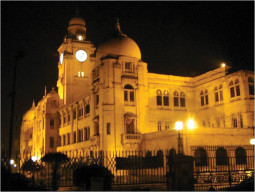
The petitioner's counsel contended that the suspension of public transport and railway operations during the coronavirus crisis had left people stranded in various locations across the country. With no other means of transport, those who tried to return to their hometowns using trucks were arrested by the police, he added.
The counsel argued that the government was operating special flights to repatriate Pakistanis stranded abroad, adding that even the borders had been opened to allow pilgrims to return. Highlighting the plight of 'trapped' citizens, he said they did not have jobs and were worried about feeding themselves.
He said that it was Ramazan, with Eidul Fitr approaching, and asked the court to order special train operations to allow these people to return home.
The court issued notices to the railways ministry and other parties to submit replies by May 8.
Pillion-riding ban
Meanwhile, the SHC also directed the petitioner to file a written reply regarding the complete ban on pillion-riding in the province after the Sindh home department and the police submitted their replies.
A two-member bench, comprising Justice Muhammad Ali Mazhar and Justice Yousuf Ali Sayeed, was hearing the petition against the ban.
According to the home department, though police officials, journalists, and women were initially exempted from the ban, the leniency was abused and therefore, all exemptions were revoked.
Petitioner Umair Anjum, a journalist, argued that the ban on pillion-riding was causing problems for mediapersons. He had stated that this was the first time that the government had banned police officials and journalists from pillion-riding, moving the court to declare the notification null and void.
Justice Mazhar stated that the court would issue its verdict on the next hearing. The court directed the petitioner to file a written reply on May 6.
'Unfair' ration distribution
Separately, the SHC directed the petitioner to submit a reply on May 14 on a petition pertaining to the unfair distribution of ration in Lyari.
The same bench was hearing the petition, where the South deputy commissioner (DC) submitted a written reply, stating that the Sindh government had formed a committee for ration distribution and had asked utility stores to check the quality of commodities before buying them.
The utility stores were unable to deliver the ration bags on time, so the government bought them from a well-known supermarket in the South district, he added. He claimed that a total of 15,710 ration bags were distributed in South district, with 6,375 in Lyari, 2,950 in Garden, 1,260 in Aram Bagh, 1,825 in Saddar, and 3,300 bags in Civil Lines.
The reply further stated that area representatives and NGO members were also included in the relief committee, while the district administration ensured monitoring of the ration distribution process.
However, the petitioner contended that the DC was misstating the facts.
Justice Mazhar asked the petitioner if there was any citizen in the area who had contacted him about not receiving rations, upon which the petitioner maintained that the government did not provide rations to anyone in the area.
The Sindh additional advocate general stated that the petitioners were demanding Rs10 trillion in cash for Lyari, which was a bigger amount than the combined budget of the province. Moreover, he added, the Sindh government had not disbursed cash to anyone, instead distributing rations across the province.
Published in The Express Tribune, May 1st, 2020.




1732745394-0/Diddy-(4)1732745394-0-165x106.webp)












COMMENTS
Comments are moderated and generally will be posted if they are on-topic and not abusive.
For more information, please see our Comments FAQ